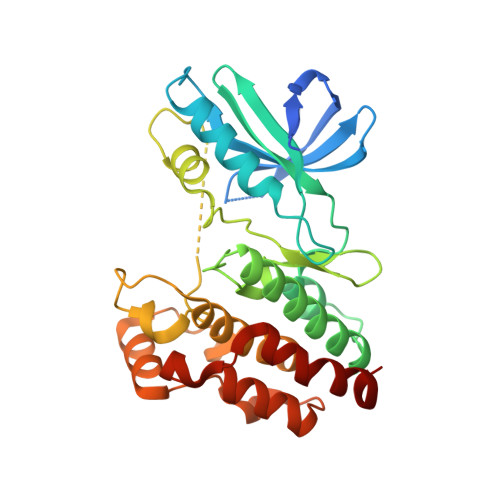RIP1 Kinase Drives Macrophage-Mediated Adaptive Immune Tolerance in Pancreatic Cancer.
Wang, W., Marinis, J.M., Beal, A.M., Savadkar, S., Wu, Y., Khan, M., Taunk, P.S., Wu, N., Su, W., Wu, J., Ahsan, A., Kurz, E., Chen, T., Yaboh, I., Li, F., Gutierrez, J., Diskin, B., Hundeyin, M., Reilly, M., Lich, J.D., Harris, P.A., Mahajan, M.K., Thorpe, J.H., Nassau, P., Mosley, J.E., Leinwand, J., Kochen Rossi, J.A., Mishra, A., Aykut, B., Glacken, M., Ochi, A., Verma, N., Kim, J.I., Vasudevaraja, V., Adeegbe, D., Almonte, C., Bagdatlioglu, E., Cohen, D.J., Wong, K.K., Bertin, J., Miller, G.(2018) Cancer Cell 34: 757-774.e7
- PubMed: 30423296
- DOI: https://doi.org/10.1016/j.ccell.2018.10.006
- Primary Citation of Related Structures:
6HHO - PubMed Abstract:
Pancreatic ductal adenocarcinoma (PDA) is characterized by immune tolerance and immunotherapeutic resistance. We discovered upregulation of receptor-interacting serine/threonine protein kinase 1 (RIP1) in tumor-associated macrophages (TAMs) in PDA. To study its role in oncogenic progression, we developed a selective small-molecule RIP1 inhibitor with high in vivo exposure. Targeting RIP1 reprogrammed TAMs toward an MHCII hi TNFα + IFNγ + immunogenic phenotype in a STAT1-dependent manner. RIP1 inhibition in TAMs resulted in cytotoxic T cell activation and T helper cell differentiation toward a mixed Th1/Th17 phenotype, leading to tumor immunity in mice and in organotypic models of human PDA. Targeting RIP1 synergized with PD1-and inducible co-stimulator-based immunotherapies. Tumor-promoting effects of RIP1 were independent of its co-association with RIP3. Collectively, our work describes RIP1 as a checkpoint kinase governing tumor immunity.
Organizational Affiliation:
S. Arthur Localio Laboratory, Department of Surgery, New York University School of Medicine, 435 East 30th Street, 4th Floor, New York, NY 10016, USA.















